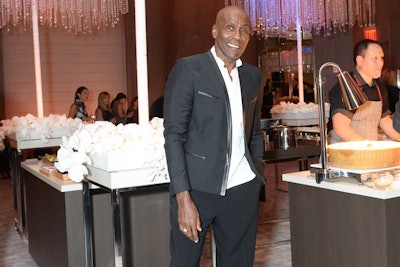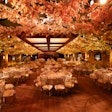
Veteran event designer Preston Bailey answers more than 70 questions from real creative professionals in his latest book, Dear Preston: Doing Business With Our Hearts: A Practical and Friendly Guide to Running Your Own Creative Service Business (Greenleaf Book Group, $23). Written in an advice column format and sprinkled with personal anecdotes, Bailey draws from his 32 years of experience in the event industry to weigh in on the questions he is asked most frequently. Bailey’s book covers topics relevant to those deep into their careers as well as those just getting started, including how to stop procrastinating, how to get the best out of your staff, how to deal with problem clients, and more. Here is an excerpt from a chapter dealing with relationships between professional partners and vendors.
Dear Preston,
I’m new to the business and want to develop good relationships with other vendors I work with. Can you give me some tips for relating to other vendors effectively and professionally while we are working together?
Thank you, Starting Off on the Right Foot
Dear Right Foot,
In a creative service business, good vendors can become like family, and we absolutely rely on them to get our jobs done. We want to foster our connection with our best vendors so that projects come off without a hitch, and so we can go on to do even more wonderful work together. Here are the ways I keep those relationships healthy and productive.
1. Communicate well during the job. Bad things happen when some members of a team have information that doesn’t make its way to the other members. I once worked as an event designer on a wedding where both the wedding planner and I were having direct conversations with the client. The guest list for this wedding increased from 200 to 225 a few weeks before the event, and the planner was notified. The trouble was, the client assumed that the planner had talked to us, and the planner assumed that we had talked with the client. So we were short tables, linens, and centerpieces for twenty-five guests on the day of the wedding! The first lesson here is that on any job, there always needs to be one primary point of contract with the client, and then convey the information to all other partnering vendors. The second lesson is that everyone involved in the job needs to be perfectly informed of every detail, not matter how small. Thank goodness we live in the age of email, where it’s so easy to include everyone on all communication. Make good use of that cc option!
2. Respect the vendor’s expertise. Of course we all know that one of the keys to good relationships is treating others with respect. But when it comes to professional partnerships, what’s really important is respect for one another’s expertise. I can’t say this strongly enough. When a client is working with many vendors, each is respected for what they’ve been hired for. We disrespect others, and lose respect for ourselves, when we interfere in areas that are not our realm of expertise. For example, I get incredibly involved in the events I design, and I have a lot of ideas about planning—I even have a planner on my staff. But if I’m working with an outside planner, I should never be offering my opinion on planning matters (unless I’m asked directly by the planner). After all, I’d be pretty offended if the planner told me how my designs could be improved. I’ve been guilty of shooting off my mouth in the past, but it’s something I work on all the time.
It’s not just me—most of us in the creative service business are pretty opinionated, so keeping our mouths shut can be a challenge. And it gets even worse when clients ask for our opinion on stuff that’s not our job. Many of you already know that this happens all the time. Clients want reassurance, and they look to us to give it to them. They aren’t thinking about our relationships with their other vendors! But even here, it’s always best to respond by deferring to the vendor who’s the expert. Encourage your client to talk with that vendor, and reminder her that the vendor is excellent at what he or she does. If you do give your opinion, support your client, but do not undermine your colleague’s authority. That’s the opposite of respect.
3. Present a united front to the client. When we work with others, conflict will emerge. We can’t avoid it: there will be miscommunication and differences of opinion, no matter how empathetic and respectful we are. Scheduling is probably the biggest source of conflict, but just about anything from work style to design taste can spark a disagreement. These disagreements are normal and we can work them out—but we should never do it in front of our clients. We always want to present a united front to our clients and no dispute should affect that.
I’ve been in situations where one vendor tries to enlist a client on his or her side in a disagreement with another vendor, and if you don’t know for yourself, trust me when I say that this is a bad situation. All vendors want their clients’ love and approval, but we shouldn’t throw other vendors under the bus to get it. It’s important that we stick together as a team, support one another and work out our disagreements among ourselves. Taking conflict to clients is bad for us and our industry, but it’s even more unfair to our clients. They just want to pull off a successful project and have a good time in the process—and we shouldn’t spoil that for them by involving them in our drama.
4. Have a post-job debriefing. After a project ends, get together with your vendors to talk about what worked, what didn’t work so well, and how everyone might serve clients better in the future. This is a great way to deepen your connection with vendors; after all, you’re showing them how committed you are to doing great work and making a point of responding to their feedback. This process of learning from each other builds trust. When they see how committed you are, who wouldn’t want to work with you again?
5. Recommend your best vendors to clients. Recommending vendors whose work you know and love is a great way to foster your connections with them and get some recommendations of your own. But don’t just recommend them—make sure you tell them you did so! Letting them know means you get credit that will likely be reciprocated in the future, but it’s also a chance to express your sincere appreciation for your professional partner. (Of course, you should never take a commission from any vendor for your recommendation.)
6. Stay in touch after the job. If I work with someone on an event and I really like their work, I treat them much as I would a client—I’ll give them a call or arrange coffee or dinner with them about once a month. I find out what my professional friends are up to, I ask about any upcoming opportunities and tell them what’s on my horizon, we may talk about exchanging recommendations. I’m also sure to ask about any new and exciting stuff they’re working on that I might be able to incorporate into my design work. A great example of this kind of relationship is my friendship with the amazing lighting designer Ira Levy. Ira is the consummate professional, and he’s always coming up with new concepts and learning about new technologies in his field. We get together regularly to talk about what’s new, and it’s always a lot of fun to brainstorm ways to use these exciting new tools in our events. But Ira and I also like to exchange photos we find inspiring over email, and these photos often find their way into our work.
7. Stay loyal. Never violate a vendor’s trust. Professionals who hire other professionals often have a stable of vendors they love to work with, and they rely on these vendors to give their work its distinct style and point of view. An interior decorator may usually work with a certain upholsterer or floor-refinisher, and a wedding planner may often work with a particular caterer or florist. If our regular vendors decide to work with someone else—or if they strike out on their own—the professional who has a prior relationship with them can feel a bit concerned, and the delicate issue of loyalty becomes important.
I once had a draper who I thought did extraordinary work draping the tents and fabrics we use for our events. He eventually expanded his business and began to market himself as an event designer, and I noticed some similarities between this person’s work on his own events and new ideas of mine that I had executed in jobs he’d worked on. Reluctantly, I had to stop hiring him—I couldn’t risk having a competitor take my creative ideas: that’s what I sell to my clients!
Even if you don’t plan to set up your own competitive business, the folks you have worked for in the past may worry that you will somehow use their ideas when you work with new people. Of course, you need to work, and often you can’t limit yourself to working with just one person. Be open with your long-standing professional partners. Tell them when you are working with a competitor and reassure them that you are protective of their ideas. Loyalty to your partners doesn’t mean never working with anyone else. It just means being committed to protecting your colleagues’ ideas in the same way that you’d protect your own.
Reprinted from Dear Preston: Doing Business With Our Hearts: A Practical and Friendly Guide to Running Your Own Creative Service Business, by Preston Bailey. Used by permission of Greenleaf Book Group.



















